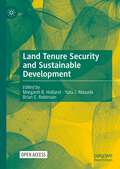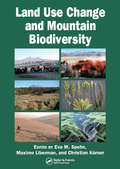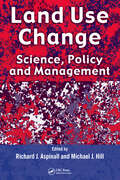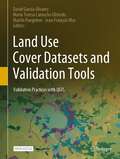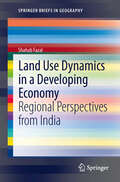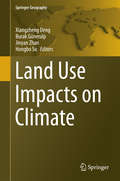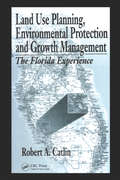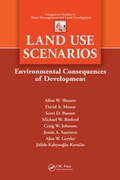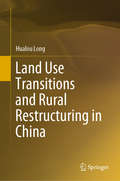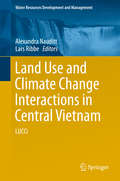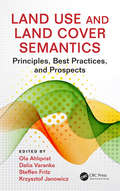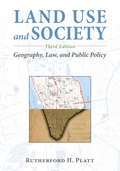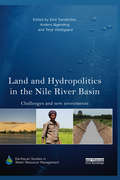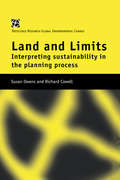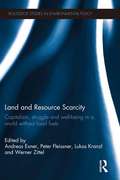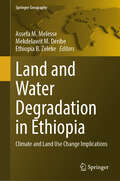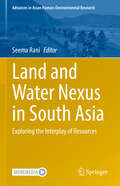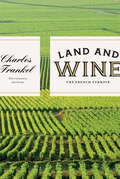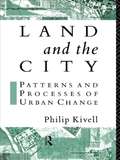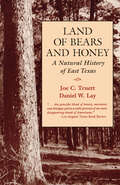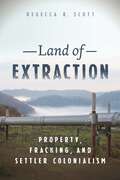- Table View
- List View
Land Tenure Security and Sustainable Development
by Margaret B. Holland Yuta J. Masuda Brian E. RobinsonThis open access book presents a nuanced and accessible synthesis of the relationship between land tenure security and sustainable development. Contributing authors have collectively worked for decades on land tenure as connected with conservation and development across all major regions of the globe. The first section of this volume is intended as a standalone primer on land tenure security and its connections with sustainable development. The book then explores key thematic challenges that interact directly with land tenure security, followed by a section on strategies for addressing tenure insecurity. The book concludes with a section on new frontiers in research, policy, and action. An invaluable reference for researchers in the field and for practitioners looking for a comprehensive overview of this important topic.This is an open access book.
Land Under the Sea
by Joan Lowery Nixon Hershell H. NixonDescribes the exploration of the land beneath the sea and what it has revealed about the topography of this vast hidden area. Also discusses how these discoveries help us better understand the earth upon which we live.
Land Use Change and Mountain Biodiversity
by Eva M. Spehn Máximo Liberman Christian KornerPart of the worldwide biodiversity program DIVERSITAS, the Global Mountain Biodiversity Assessment (GMBA) assesses the biological richness of high-elevation biota. GMBA's focus includes the uppermost forest regions or their substitute rangeland vegetation, the treeline ecotone, and the alpine and nival belts. Providing more than description, the GM
Land Use Change: Science, Policy and Management
by Michael J. Hill Richard J. AspinallChanges in the use of land reflect a variety of environmental and social factors, necessitating an equally varied suite of data to be used for effective analysis. While remote sensing, both from satellites and air photos, provides a central resource for study, socio-economic surveys, censuses, and map sources also supply a wealth of valid informati
Land Use Cover Datasets and Validation Tools: Validation Practices with QGIS
by María Teresa Camacho Olmedo Martin Paegelow David García-Álvarez Jean François MasThis open access book represents a comprehensive review of available land-use cover data and techniques to validate and analyze this type of spatial information. The book provides the basic theory needed to understand the progress of LUCC mapping/modeling validation practice. It makes accessible to any interested user most of the research community's methods and techniques to validate LUC maps and models. Besides, this book is enriched with practical exercises to be applied with QGIS. The book includes a description of relevant global and supra-national LUC datasets currently available. Finally, the book provides the user with all the information required to manage and download these datasets.
Land Use Dynamics in a Developing Economy
by Shahab FazalToday, India still remains a rural agricultural country although the share of urban population has also increased but these figures do not tell the whole story. There are evidences that urban growth is dispersed and urban sprawl promotes the spread of urban land use into the rural-urban fringe. Here the attempt is to investigate the land transformation and the driving forces which were influencing the land transformation. The present study was done on peri urban interface of Aligarh city, a relatively small city, but as other north Indian cities, it is also expanding rapidly. Moreover, it too is surrounded by a populous rural area with productive and rich agricultural hinterland. Such conditions give rise to many conflicts and mutually beneficial complementarities in the rural and urban spheres. The result shows that the demand for land is high which results in informal urban development fulfilling the requirements of many of the city's residents. Every piece of land is a tradable commodity, and the pursuit of short-term profits is the predominant ethic. The actors in PUI are strong because it is characterized by intermixing of rural and urban activities and interests as well as the number of actors are greater than in any other area. .
Land Use Impacts on Climate
by Xiangzheng Deng Jinyan Zhan Burak Güneralp Hongbo SuThis book introduces a key issue in research on the climatic impact of land cover and land use changes via terrestrial biogeophysical processes. The parameterization of surface processes and a systematic approach to modeling the climatic impacts of land use change are discussed respectively, and can be used to improve parameterization schemes for climate numerical models and to provide a systematic method, thus offering more scientific and enhanced support for research on the climatic effects of land use/cover change. Further, based on predictions and scenario analyses of land use changes in typical zones, the climatic impact of various types of changes in different areas can be simulated through climatic numerical modeling, the simulation results are suitable for use in climate mitigation, land use planning, urban development planning, etc. Thus, the book is intended for researchers and professionals working in the area of meteorology systems, climatic numerical modeling, climate change, and land use/cover change, as well as decision makers in meteorology and land use planning. Professor Xiangzheng Deng is a senior research fellow at the Institute of Geographical Sciences and Natural Resources Research, Chinese Academy of Sciences.
Land Use Planning, Environmental Protection and Growth Management: The Florida Experience
by Robert A CatlinThis book examines the history and impact of Florida's Comprehensive Planning legislation. Topics include coastal zone management, solid waste planning, land use impacts, planning strategies, and more.
Land Use Scenarios: Environmental Consequences of Development (Integrative Studies in Water Management & Land Development)
by David A. Mouat Alan W. Shearer Scott D. Bassett Michael W. Binford Craig W. Johnson Justin A. Saarinen Alan W. Gertler Julide KoracinAny alteration of the natural processes occurring on a piece of land will have expected as well as unanticipated effects, and those effects have little regard for arbitrary human boundaries. Consequently, it is not enough for land managers to consider only how they might maintain the parcels for which they are responsible; they must also anticipate
Land Use Transitions and Rural Restructuring in China
by Hualou LongIntended as a comprehensive guide to the study of land use and rural development, this book offers detailed descriptions of land use transitions and rural restructuring. To do so, it chiefly focuses on three main aspects, the first of which is the application of geographical perspectives in order to understand rural issues in connection with urbanization, industrialization, globalization and rural vitalization strategies in contemporary China. Secondly, it presents a rich blend of regional and national analyses; detailed explorations of local cases; and critical and theoretically informed discussions that address historical paths and future projections. Lastly, it adapts concepts derived from western literature to situations and experiences in rural China, and provides empirical evidence from an “insider” perspective. Given its scope, the book offers a valuable resource for researchers, and for graduate students / courses in geography and sociology.
Land Use and Climate Change Interactions in Central Vietnam
by Alexandra Nauditt Lars RibbeThis book summarizes the key findings of a five-year interdisciplinary research project funded by the German Federal Ministry of Research and Education (BMBF). It serves as a typical case study for a rapidly growing and developing urban center - Da Nang City, which is surrounded by remote areas characterized by increasing migration and limited development. A number of German and Vietnamese universities and international institutions participated in the project, contributing their particular expertise to assess the data-scarce region under study, two provinces in central Vietnam with a combined area of ca. 12,000 km#65533;.
Land Use and Land Cover Semantics: Principles, Best Practices, and Prospects
by Steffen Fritz Ola Ahlqvist Krzysztof Janowicz Dalia VarankaExplore the Important Role that the Semantics of Land Use and Land Cover Plays within a Broader Environmental ContextFocused on the information semantics of land use and land cover (LULC) and providing a platform for reassessing this field, Land Use and Land Cover Semantics: Principles, Best Practices, and Prospects presents a comprehensive overview of fundamental theories and best practices for applying semantics in LULC. Developed by a team of experts bridging relevant areas related to the subject (LULC studies, ontology, semantic uncertainty, information science, and earth observation), this book encourages effective and critical uses of LULC data and considers practical contexts where LULC semantics can play a vital role.The book includes work on conceptual and technological semantic practices, including but not limited to categorization; the definition of criteria for sets and their members; metadata; documentation for data reuse; ontology logic restrictions; reasoning from text sources; and explicit semantic specifications, ontologies, vocabularies, and design patterns. It also includes use cases from applicable semantics in searches, LULC classification, spatial analysis and visualization, issues of Big Data, knowledge infrastructures and their organization, and integration of bottom-up and top-down approaches to collaboration frameworks and interdisciplinary challenges such as EarthCube. This book: Centers on the link between planning goals, objectives, and policy and land use classification systems Uses examples of maps and databases to draw attention to the problems of semantic integration of land use/cover data Discusses the principles used in a categorization Explores the origins and impacts of semantic variation using the example of land cover Examines how crowd science and human perceptions can be used to improve the quality of land cover datasets, and more Land Use and Land Cover Semantics: Principles, Best Practices, and Prospects offers an up-to-date account of land use/land cover semantics, looks into aspects of semantic data modeling, and discusses current approaches, ongoing developments, and future trends. The book provides guidance to anyone working with land use or land cover data, looking to harmonize categories, repurpose data, or otherwise develop or use LULC datasets.
Land Use and Society: Geography, Law, and Public Policy
by Rutherford H. PlattThe intersection between geography and law is a critical yet often overlooked element of land-use decisions, with a widespread impact on how societies use the land, water, and biodiversity around them. Land Use and Society, Third Edition is a clear and compelling guide to the role of law in shaping patterns of land use and environmental management. Originally published in 1996 and revised in 2004, this third edition has been updated with data from the 2010 U. S. Census and revised with the input of academics and professors to address the changing issues in land use, policy, and law today. Land Use and Society, Third Edition retains the historical approach of the original text while providing a more concise and topical survey of the evolution of urban land use regulation, from Europe in the Middle Ages through the present day United States. Rutherford Platt examines the "nuts and bolts" of land use decision-making in the present day and analyzes key players, including private landowners, local and national governments, and the courts. This third edition is enhanced by a discussion of the current trends and issues in land use, from urban renewal and demographic shifts in cities to the growing influence of local governance in land use management. Land Use and Society, Third Edition is a vital resource for any student seeking to understand the intersection between law, politics, and the natural world. While Platt examines specific rules, doctrines, and practices from an American context, an understanding of the role of law in shaping land use decisions will prove vital for students, policymakers, and land use managers around the world.
Land Use and the Carbon Cycle
by Daniel G. Brown Derek T. Robinson Nancy H. F. French Bradley C. ReedAs governments and institutions work to ameliorate the effects of anthropogenic CO2 emissions on global climate, there is an increasing need to understand how land-use and land-cover change is coupled to the carbon cycle, and how land management can be used to mitigate their effects. This book brings an interdisciplinary team of fifty-eight international researchers to share their novel approaches, concepts, theories and knowledge on land use and the carbon cycle. It discusses contemporary theories and approaches combined with state-of-the-art technologies. The central theme is that land use and land management are tightly integrated with the carbon cycle and it is necessary to study these processes as a single natural-human system to improve carbon accounting and mitigate climate change. The book is an invaluable resource for advanced students, researchers, land-use planners and policy makers in natural resources, geography, forestry, agricultural science, ecology, atmospheric science and environmental economics.
Land and Hydropolitics in the Nile River Basin: Challenges and new investments (Earthscan Studies in Water Resource Management)
by Terje Oestigaard Anders Jägerskog Emil SandströmThe Nile River Basin supports the livelihoods of millions of people in Egypt, Ethiopia, Sudan and Uganda, principally as water for agriculture and hydropower. The resource is the focus of much contested development, not only between upstream and downstream neighbours, but also from countries outside the region. This book investigates the water, land and energy nexus in the Nile Basin.It explains how the current surge in land and energy investments, both by foreign actors as well as domestic investors, affects already strained transboundary relations in the region and how investments are intertwined within wider contexts of Nile Basin history, politics and economy. Overall, the book presents a range of perspectives, drawing on political science, international relations theory, sociology, history and political ecology.
Land and Limits: Interpreting Sustainability in the Planning Process (Rtpi Library Ser.)
by Richard Cowell Susan OwensIn a new and critical analysis, this book explores the impact of an influential idea - sustainable development - on the institutions and practices governing use of land. It examines the paradox that in spite of increasing attention to sustainability, land use conflict is as ubiquitous and intense as ever.
Land and Resource Scarcity: Capitalism, Struggle and Well-being in a World without Fossil Fuels (Routledge Studies in Environmental Policy)
by Andreas Exner Lukas Kranzl Peter Fleissner Werner ZittelThis book brings together geological, biological, radical economic, technological, historical and social perspectives on peak oil and other scarce resources. The contributors to this volume argue that these scarcities will put an end to the capitalist system as we know it and alternatives must be created. The book combines natural science with emancipatory thinking, focusing on bottom up alternatives and social struggles to change the world by taking action. The volume introduces original contributions to the debates on peak oil, land grabbing and social alternatives, thus creating a synthesis to gain an overview of the multiple crises of our times. The book sets out to analyse how crises of energy, climate, metals, minerals and the soil relate to the global land grab which has accelerated greatly since 2008, as well as to examine the crisis of profit production and political legitimacy. Based on a theoretical understanding of the multiple crises and the effects of peak oil and other scarcities on capital accumulation, the contributors explore the social innovations that provide an alternative. Using the most up to date research on resource crises, this integrative and critical analysis brings together the issues with a radical perspective on possibilites for future change as well as a strong social economic and ethical dimesion. The book should be of interest to researchers and students of environmental policy, politics, sustainable development and natural resource management.
Land and Water Degradation in Ethiopia: Climate and Land Use Change Implications (Springer Geography)
by Assefa M. Melesse Mekdelawit M. Deribe Ethiopia B. ZelekeWater is life for all human beings and is essential for sustainable economic development. Access to freshwater is a fundamental human right. Ensuring access to safe drinking water and sanitation is vital for economic growth, poverty reduction and enhancement of human well-being. Yet, uncertain global water availability compounded by factors such as climate change and land degradation have made meeting the growing water demand a daunting task for many communities. The world is facing an unprecedented climate crisis, intricately linked with water resources. We have witnessed frequent and intense hydrologic extremes (floods and droughts). In the past decade alone, floods, storms, droughts, and other weather-related events accounted for over 90% of natural disasters. Water, being at the center of national policies of many countries, the impact of climate change on water resources extends across multiple sectors including energy production, food security, health, environmental conservation, and economic development. Research has shown that climate change has impacted the hydrologic cycle, affected the availability and predictability of water, and hence threatened the efforts of poverty reduction and economic development. These impacts are more pronounced in developing countries, exacerbating existing socioeconomic challenges, and hindering progress towards self-sufficiency in food, water, and energy production. The impact of climate change on these countries is further aggravated by land degradation, land use changes, unsustainable agricultural practices, poor watershed management and ecological degradation and loss of biodiversity. This book aims to explore these issues, with chapters dedicated to examining land and water degradation, water quality, irrigation, groundwater management, land use dynamics and the impacts of climate change on freshwater resources in Ethiopia.
Land and Water Nexus in South Asia: Exploring the Interplay of Resources (Advances in Asian Human-Environmental Research)
by Seema RaniThis book aims to unravel the intricate relationship between land and water resources and delve into their interdependencies, synergies, and challenges. As the world grapples with pressing issues such as water scarcity, land degradation, and climate change, understanding the complex dynamics and interplay between these two critical resources has become more crucial than ever. This comprehensive volume brings together multidisciplinary perspectives from leading experts in the field, offering an integrated approach to studying the land-water nexus. The book provides readers with a clear understanding of how land and water interact and delves into key topics such as land use change and its impacts on water resources, water management in agricultural landscapes, land-water interactions in aquatic ecosystems, urbanization and water resource management, and climate change's influence on the land-water nexus. Moreover, the book investigates integrated governance frameworks, policy considerations, and sustainable development approaches that are essential for effective land and water resource management. It also sheds light on future perspectives and research frontiers, envisioning innovative solutions to address emerging challenges in this field. By synthesizing current knowledge, showcasing case studies, and presenting cutting-edge research, this book provides a valuable resource for researchers, policymakers, and professionals working in water resource management, environmental science, agriculture, urban planning, and sustainable development. The book's holistic approach encourages readers to envision sustainable pathways that balance the needs of both land and water, fostering a resilient and harmonious future for our planet.
Land and Water Student Activity Book
by The Editors at the The National Science Resources CenterThe book talks about land, water, their importance, and ways of preserving these natural resources along with related activities for students.
Land and Wine: The French Terroir
by Charles FrankelThis in-depth tour of the French winemaking regions illustrates how the soil, underlying bedrock, and microclimate shape the personality of a wine.France has long been the world’s greatest wine-producing country. Its various regions each offer unique tasting experiences, from the spice of Bordeaux to the berry notes of the Loire Valley. In Land and Wine, geologist Charles Frankel guides readers through these and ten other regions, including Alsace, Burgundy, Champagne, Provence, and the Rhône valley, to explore the full meaning of terroir.Frankel describes how Cabernet Franc takes on a completely different character depending on whether it is grown on gravel or limestone; how Sauvignon yields three different products in the hills of Sancerre; how Pinot Noir will give radically different wines on a single hill in Burgundy as the vines progress upslope; and how the soil of each château in Bordeaux has a say in the blend ratios of Merlot and Cabernet-Sauvignon.Land and Wine provides a detailed understanding of the variety of French wine as well as a look at the geological history of France, complete with volcanic eruptions, dinosaurs, and a menagerie of fossils flavoring the vineyards. Frankel also blends in anecdotes about winemakers and historic wine enthusiasts while offering travel tips and itineraries for visiting the wineries today.
Land and the City: Patterns and Processes of Urban Change (Geography And Environment Ser.)
by Philip KivellFirst Published in 2004. Routledge is an imprint of Taylor & Francis, an informa company.
Land of Bears and Honey: A Natural History of East Texas
by Joe C. Truett Daniel W. LayThis award-winning &“gem&” of a conservation classic tells the story of the land, wildlife, and ecology of East Texas (Quarterly Review of Biology).Winner of the Ottis Lock Endowment Award from the East Texas Historical Association; the Texas Literary Festival Award for Nonfiction from the Southwestern Booksellers Association & Dallas Times Herald; and the Annual Publication Award, Texas Chapter of the Wildlife Society As hickory groves and fox squirrels began to vanish from the East Texas landscape in the second half of the twentieth century, two biologists who specialized in wildlife and endangered species began work on Land of Bears and Honey. Their purpose was not only to eulogize what was lost, but to encourage us to save what we still can. The result is an &“elegant chronicle of the natural history of a once-rich area [that] will appeal strongly to birders, ecologists, to anyone who enjoys the outdoors&” (Publishers Weekly). &“This deceptively slender volume is three things: a how-to-book, an aesthetic feast and a moral tale.&” —Dallas Morning News &“To compare the style and content of this little book to that of the late Aldo Leopold is indeed high praise, yet the reviewer finds this comparison valid.&” —Quarterly Review of Biology &“In Land of Bears and Honey, East Texans have their own regional Walden, written with keen historical perspectives, literary style, and deep respect for the land.&” —East Texas Historical Journal &“This graceful blend of history, narrative and dialogue paints a noble portrait of one more disappearing chunk of Americana.&” —Los Angeles Times Book Review
Land of Bears and Honey: A Natural History of East Texas
by Joe C. Truett Daniel W. LayThis award-winning &“gem&” of a conservation classic tells the story of the land, wildlife, and ecology of East Texas (Quarterly Review of Biology).Winner of the Ottis Lock Endowment Award from the East Texas Historical Association; the Texas Literary Festival Award for Nonfiction from the Southwestern Booksellers Association & Dallas Times Herald; and the Annual Publication Award, Texas Chapter of the Wildlife Society As hickory groves and fox squirrels began to vanish from the East Texas landscape in the second half of the twentieth century, two biologists who specialized in wildlife and endangered species began work on Land of Bears and Honey. Their purpose was not only to eulogize what was lost, but to encourage us to save what we still can. The result is an &“elegant chronicle of the natural history of a once-rich area [that] will appeal strongly to birders, ecologists, to anyone who enjoys the outdoors&” (Publishers Weekly). &“This deceptively slender volume is three things: a how-to-book, an aesthetic feast and a moral tale.&” —Dallas Morning News &“To compare the style and content of this little book to that of the late Aldo Leopold is indeed high praise, yet the reviewer finds this comparison valid.&” —Quarterly Review of Biology &“In Land of Bears and Honey, East Texans have their own regional Walden, written with keen historical perspectives, literary style, and deep respect for the land.&” —East Texas Historical Journal &“This graceful blend of history, narrative and dialogue paints a noble portrait of one more disappearing chunk of Americana.&” —Los Angeles Times Book Review
Land of Extraction: Property, Fracking, and Settler Colonialism
by Rebecca R. Scott2024 Outstanding Academic Title, given by Choice ReviewsExplores fracking’s dual impact on settler colonial culture and sustainabilityThrough meticulous research and poignant storytelling, Land of Extraction unravels the complex web of relationships between humans, places, and the environment, all bound by the concept of private property. It presents a thought-provoking analysis of how settler colonial culture imposes limits on environmental politics.Drawing on real-life events, fictional portrayals of fossil-fuel driven apocalypses, and firsthand ethnographic accounts of the fracking and pipeline boom in West Virginia, Rebecca R. Scott argues that the American dream’s promise of empowerment through property ownership actually restricts action against extractive industries and hampers the progress of environmental justice coalitions.As the ever-expanding reach of natural gas and pipeline industries takes its toll on communities, the book reveals the fractures in landowners’ reliance on private property, opening the door to more sustainable futures. A powerful call to reevaluate our perspectives and challenge the status quo, this book will leave readers questioning the foundations of our society and the possibilities that lie ahead.
